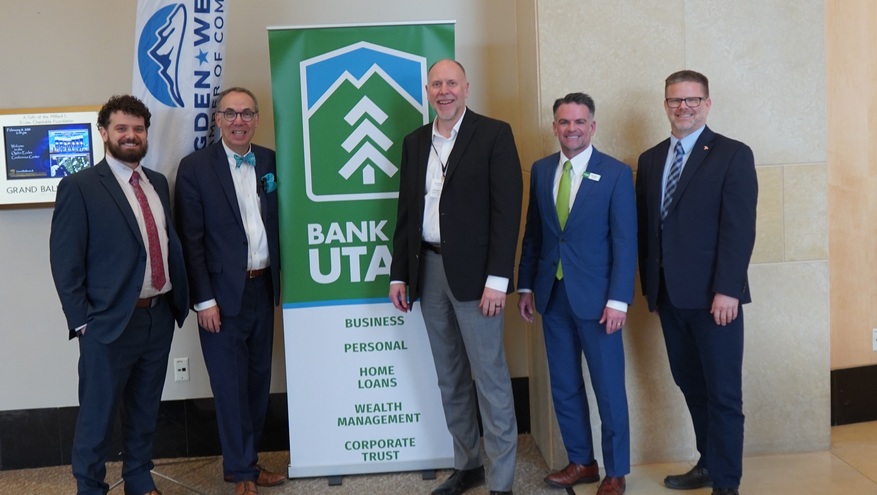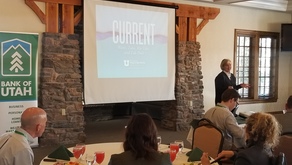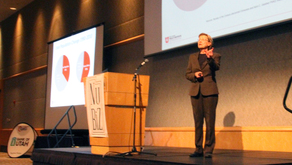Renowned economist Dr. Elliot Eisenberg, known as the “Bowtie Economist”, treated business leaders across the Wasatch Front to intriguing economic insights at Bank of Utah’s 2024 Economic Forecasts held in Layton, Salt Lake City, Logan, Lehi and Ogden this February. Additionally, local experts discussed topics such as the local economy, population trends and leadership in a few other locations.
A Recession Could Be Coming
Eisenberg is an internationally acclaimed economist and public speaker specializing in making economics fun, relevant and educational. He expressed his belief that a recession is likely on the horizon, albeit one of a “garden-variety nature”, meaning it will be less severe and shorter lived. “I want you to leave a little worried,” Eisenberg said, pinching his thumb and forefinger closely together to indicate just how little, “but not in a panic.”
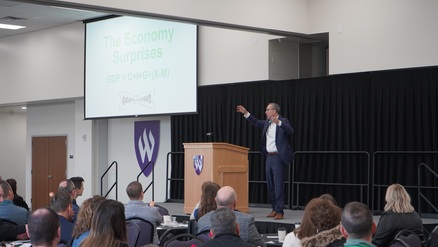
He highlighted various factors suggesting a potential recession in the coming year, possibly as early as March. Notably, the lingering effects of the pandemic remain a significant variable. Eisenberg acknowledged the ongoing economic consequences of COVID, noting that while there’s a chance of a full-blown recession, the slow, continuing recovery from the pandemic might help the country avoid one.
The expectation that the Federal Open Markets Committee, which establishes the federal funds rate, won’t be cutting the rate in March adds weight to his belief that a recession might be looming. He backed up this viewpoint by sharing a graph illustrating that 10 out of 13 times the Fed hiked interest rates, the country has gone into recession.
Housing Market Challenges
Eisenberg humorously pointed out the sluggish rebound in the housing market, jokingly attributing it to homeowners’ reluctance to sell their homes, particularly those benefiting from low-interest mortgages. He quipped, “You all are selfish,” referring to the fact that those with 3 percent interest on their mortgages will never sell. “You will move and rent them out before you sell that house!” he added.
Challenges with Delinquent Payments
Additionally, Eisenberg highlighted concerning trends such as rising delinquency rates among certain age groups. He noted that while spending is increasing, it’s not keeping up with wages and inflation, posing potential challenges. Young adults in their 20s and 30s are falling behind on their car and credit card payments, resulting in higher delinquency rates than the country has seen in decades. In contrast, individuals aged 40 and above, who typically make more money, face fewer challenges in paying their bills on time, Dr. Eisenberg said.
Key Takeaways
Eisenberg distilled his analysis into several key takeaways, offering valuable insights into the economic landscape ahead. He noted that:
- 2024 will probably not be a great year.
- The Fed has stopped raising rates.
- Job growth will most likely slow.
- Inflation should keep decelerating.
- Watch inflation and unemployment (as they play a pivotal role in assessing economic health).
Dr. Eisenberg’s slides from his presentation were packed with interesting facts and graphs explaining many of his thoughts and theories.
View his slides and hear his address:
Elliot Eisenberg: Slides
Elliot Eisenberg: Keynote Speech
Davis County Economic Summit Features Leadership Expert Rob Jeppsen
Prior to Eisenberg’s address, the crowd at Weber State University Davis heard from Rob Jeppsen, managing director of Jeppsen Performance Group and the founder of Sales Leadership United. Jeppsen delivered a high-energy lecture on the keys of leadership success. He focused on what he called the seven C’s to becoming a great leader:- Character
- Competency
- Capacity
- Clarity
- Connection
- Culture
- Consistency
He challenged the audience to institute the value of belief because it is contagious. “Elite leaders are the most committed believers,” he said.
This was the first year Bank of Utah and the Davis County Chamber of Commerce partnered for the economic event.
Rob Jeppsen: Slides
Mallory Bateman Shares Insights on Utah’s Changing Demographics at Utah County Forecast
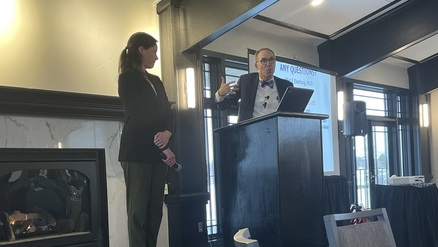 At the Lehi session, Mallory Bateman, director of demographic research and state data center coordinator at the Kem C. Gardner Policy Institute at the University of Utah, shared captivating insights into Utah’s ever-changing demographics. Much of her information complemented Eisenberg’s address.
At the Lehi session, Mallory Bateman, director of demographic research and state data center coordinator at the Kem C. Gardner Policy Institute at the University of Utah, shared captivating insights into Utah’s ever-changing demographics. Much of her information complemented Eisenberg’s address.Bateman began by saying that change is the only constant in Utah’s demographic landscape, with Utah County being a key player in these shifts. She touched on the growing racial and ethnic diversity in Utah, predicting that Utah will continue to become more diverse. In addition, while Utah is still beating many other states with its growth rate, Bateman said it is slowing down somewhat. Migration is a large piece of the population puzzle, with many people moving to Utah from California, Texas and Idaho. She concluded that growth is a better option than decline and Utah’s study growth helps to stimulate the economy.
Bank of Utah and the Utah County Chamber of Commerce co-sponsored the Utah County event held at Thanksgiving Point.
Mallory Bateman: Slides
Mallory Bateman: Speech
Economic Forecast in Ogden Highlights Cybersecurity and Utah’s Resilient Economy
In Ogden, the Eccles Conference Center served as the venue for the Economic Forecast, co-sponsored by the Ogden-Weber Chamber of Commerce. In addition to Eisenberg, the speakers were Randy Boyle, Ph.D., a professor at the Goddard School of Business & Economics at Weber State University, and Michael Jeanfreau, senior economist at Utah’s Department of Workforce Services.Boyle shared his knowledge and expertise in the field of cybersecurity, highlighting the growing role of artificial intelligence (AI) in cybersecurity and its potential impact on job growth. However, he also emphasized the importance of human skills in securing future employment, including:
- Novel problem solving
- Systemic thinking
- Experimentation
- Collaboration
“Cybersecurity is adapting to AI,” Boyle said. He suggested that the best thing people can do is to teach their children to be good people with high standards so they won’t be tempted to use AI in a negative way.
Randy Boyle: Slides
Randy Boyle: Speech
Michael Jeanfreau spoke just before Eisenberg and shared information about Utah’s economy. He noted Utah’s swift economic recovery from the pandemic, with the addition of 150 more jobs statewide compared to pre-pandemic levels. “Utah is an educated state. We like education,” Jeanfreau said. “However, that sometimes can be a mismatch because it can be tough to find jobs that mirror the education people are receiving.”
Jeanfreau explained that Utah’s job market is increasingly offering opportunities for individuals with only a high school education. He also addressed the issue of an aging workforce not being replaced quickly enough, but did point out that Utah is doing better in that area than other states.
In addition, Jeanfreau noted that because more and more people are moving to Utah, Utah is suffering from a housing shortage, which has caused home prices to increase dramatically. Despite these challenges, he expressed optimism about Utah’s robust economy, attributing it to a rising population, educated workforce and a vibrant entrepreneurial environment. He concluded by suggesting that Utah’s stronger economy would mitigate the impact of a recession compared to other states.
Michael Jeanfreau: Slides
Michael Jeanfreau: Speech

